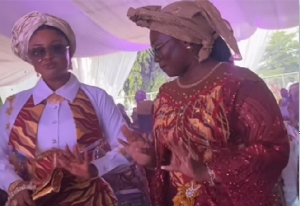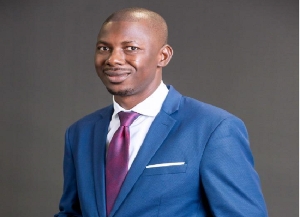Opinions of Sunday, 22 May 2011
Columnist: Bokor, Michael J. K.
Our judges shouldn’t judge themselves—as angels! Part II
Part II
By Dr. Michael J.K. Bokor
E-mail: mjbokor@yahoo.com
May 20, 2011
The Association of Judgers and Magistrates is being wayward. After all, if it were not so, why would the judge who sat at the Supreme Court to adjudicate the case involving Dr. Atuguba’s client (Dramani Sakande, MP for Bawku Central) adjourn the case “sine die” in a direct, quick, and irresponsible response to the “blacklisting” of Dr. Atuguba? Is this not a miscalculation since the General Legal Council hasn’t yet determined the case put before it to warrant any such boycott of the case being defended by Dr. Atuguba and the others?
Indeed, the decision to blacklist these four public-spirited citizens is itself fraught with mischief and is a calculated attempt to gag people whose viewpoints on the Judiciary are needed to determine how corruption should be tackled in that sector. No one should support this stance of the judges and magistrates because it is a horrible precedent that conflicts with the tenets of our democracy.
Several complaints have been heard from Ghanaians about the rot in the Judiciary (consisting not only the courts but also the Police Service, Prison Service, and the Ministry of Justice and the Attorney-General’s Department). These sectors of the justice-delivery network are vital for not only dispensing justice but also for cooperating with the public to eradicate anti-social practices that undermine our democracy.
The court system can’t isolate itself for special mention or commendation if it is, indeed, part of the problem that the public has over the years identified. That’s what the judges and magistrates must be told. They are not above corruption. We have said it several times, even to a fault, that there is laxity in the justice-delivery system and that the judges and magistrates have an onerous responsibility to live above reproach—but evidence shows that they don’t. The burden is on them to persuade the public through responsible conduct that they are incorruptible, not to merely bare their teeth at those who are bold enough to take them on.
Until they do so, they will be the butt of public criticism, disdain, repudiation, and anger. I wish the judges and magistrates will take a leaf from the IGP’s record of open admission of the problem of corruption in his organization and how he has responded to criticisms. Is it not a routine for people to accuse the police of corruption? How many times hasn’t the Police Administration acknowledged that accusation and indicated its preparedness to work with the public to solve the problem? Do the police blacklist people who accuse them of corruption or do they refuse to perform functions in response to such allegations?
Again, how many times haven’t people accused government functionaries (including the Presidents that we’ve had) of bribery and corruption? Have they blacklisted anybody or taken the law into their own hands to do the kind of thing that the judges and magistrates have resorted to? The judges and magistrates are now completely out of control. Indiscipline has now taken the better part of them and they must be warned to rein their emotions in or end up scathed. They may be hurt by the allegation but need to take caution in their reaction because an insult is not more painful than when it is true (Shakespeare says).
I am tempted to guess that unless they take prompt action to fall back in step and stop creating negative impressions about themselves, the spate of open criticisms against their (mis)conduct will not abate.
They should expect a heightening instead for as long as they give us the negative things that will make us see them as part of the problem, not its solution. If they continue to give cause for suspicion and disquiet, they will be taken to task. Giving the public a good account of themselves should be a better way to help change the negative perception of their attitude to and performance in public-office holding.
No amount of threat or misguided action (such as this so-called boycott or any other punitive measure that the General Legal Council may come up with) will intimidate anybody. We will continue to condemn the negative things that they do and praise those that will help us grow our democracy.
Bribery and corruption are not restricted to only the executive and legislative branches of government. As a pervasive social canker, they reside in the Judiciary too. Admitting that fact is half-way toward helping us solve the problem. But if the judges and magistrates think that sweeping it under the rug is their solution, they will be deceiving themselves because not only will they lose public trust thereby but they will also stand alone, helpless, if the government “strangles” them by denying them the resources they need to function effectively.
We know how much former President Kufuor’s government provided for the judges/magistrates and what the current government is doing to improve their conditions of service. Committing resources to improve the lot of the Judiciary suggests that the citizens have a stake in whatever happens in that area. Not only do they have the right to question the performance of the Judiciary but they also have every right to monitor all that goes on. They are enjoined to take on anything (or anybody) whose conduct raises doubts or questions about morality. That’s what the four lawyers have risen up to do. What is criminal or reprehensible about their allegation, more so when it is based on research findings?
The effort to provide adequate resources to enhance the work of the Judiciary must be requited with decent conduct and the zeal to work assiduously to improve governance. It shouldn’t be misconstrued or abused. Our judges and magistrates should use this open criticism of them as an eye-opener to do enough soul-searching so that they can redeem themselves and rebuild their image. The allegations were made without malice afore-thought. They were the inevitable public outpourings of people whose contributions are needed to advance the cause of justice.
These people’s sentiments are representative of the pent-up feelings of those voiceless citizens who chafe at the knowledge that it is their tax money that is supporting those in public office whose conduct they don’t like but have no means to complain about. The four lawyers are mere conduits for such voiceless but aggrieved citizens. They are for now our heroes and no one will be allowed to intimidate them.
Let the Chief Justice and her Judicial Council (let alone the General Legal Council) not be deceived by their familiarity with the laws of the land that they can place themselves above these very laws that they have sworn and are charged to uphold. When the Privileges Committee of Parliament constituted itself into a “Sanhedrin” to intimidate Ghanaians who were bold enough to criticize the work of Parliament, we came out boldly to condemn it. We will do so again if given the slightest cause that some segments of our body politic want to place themselves above all of us to behave as if they are untouchable.
That’s exactly what we will do to the Judiciary too if it begins doing what will annoy us. After all, we are the tax-payers whose blood, sweat, and tears support their lifestyles. Let these judges and magistrates not overstep bounds. Otherwise, they stand to lose big time. They will have nothing to gain from these strong-arm tactics or unconscionable overreaction to genuine concerns being expressed against corruption in that sector of national life.
The Judiciary is corrupt to the marrow, I repeat. And the only way we can clean it is to join hands with those who have first-hand knowledge about this rot and to seek solutions. Working concertedly for workable solutions is the answer, not seeking vengeance.












